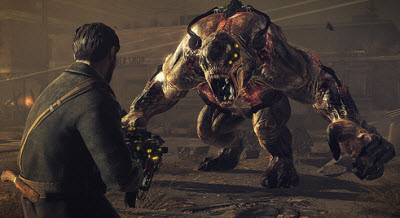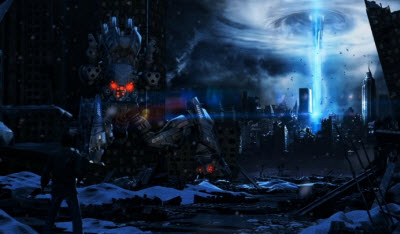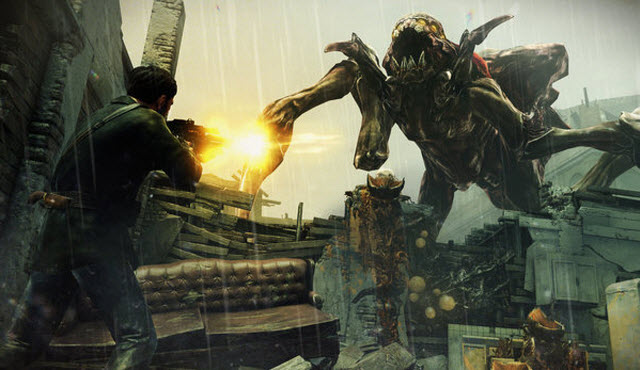
Editor’s note: some story spoilers.
It takes me a while to finish games these days because this thing called work keeps getting in the way. But I managed to play Resistance 3 from start to finish on the PlayStation 3, and I’m glad I spared the time for it. Sony picked the early slot of the release of this game, kicking off the fall sales season. And it’s a great way to kick off a season of blockbusters on the consoles.
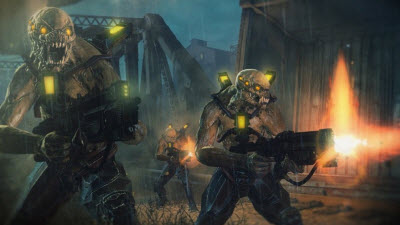 Sony needs exclusive games like Resistance, as it is still in third place in the console war and the series is one of its best-selling flagships in the sci-fi shooter genre that generates a huge amount of revenues in the video game market. Alongside titles like Killzone and Infamous, Resistance is the kind of title that brings gamers back to the PS 3, even after a debacle like the outage of the PlayStation Network. In an age of Farmville and Angry Birds, Resistance 3 shows that you can still have a hell of a lot of fun playing a single player console game for 10 hours or more. To me, this intense combat fest is the real kickoff to an incredible season of hardcore video games that will keep us all glued to our controllers.
Sony needs exclusive games like Resistance, as it is still in third place in the console war and the series is one of its best-selling flagships in the sci-fi shooter genre that generates a huge amount of revenues in the video game market. Alongside titles like Killzone and Infamous, Resistance is the kind of title that brings gamers back to the PS 3, even after a debacle like the outage of the PlayStation Network. In an age of Farmville and Angry Birds, Resistance 3 shows that you can still have a hell of a lot of fun playing a single player console game for 10 hours or more. To me, this intense combat fest is the real kickoff to an incredible season of hardcore video games that will keep us all glued to our controllers.
The hallmarks of Resistance games include a deep story, a wide variety of weapons for dealing with a wide array of enemies, and outstanding 3D graphics that show off the rendering power of the PlayStation 3. This game series is often compared to Gears of War, Epic Games’ exclusive series for the Microsoft Xbox 360, because they are both state-of-the-art sci-fi shooters set in a post-apocalyptic world. Gears of War 3 is debuting almost at the same time, on Sept. 20, on the Xbox 360. I always thought that Gears was slightly better because it had more compelling characters and stories that touched you emotionally. I mentioned this to Ted Price, head of game developer Insomniac Games, a few years ago and he acknowledged the story and characters could be better, and that they were working on it. And it turns out Insomniac finally got the storytelling part right in the third installment of Resistance.
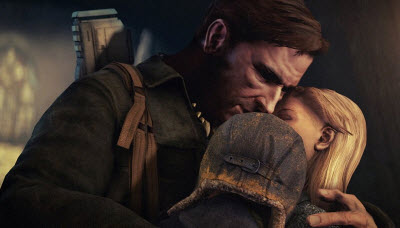 Getting the storytelling right
Getting the storytelling right
I’m still a little bleary-eyed from playing the game late at night, but this is what I remember about the story. It’s worth explaining because it gets to the heart of what is good and bad about the Resistance games. This game is the third in the series from Insomniac Games since Resistance: Fall of Man debut as a launch title on the PS 3. The first two games starred the main character Nathan Hale, who didn’t say much and shot a lot. The first game’s story begins in an alternate history in 1951 where World War II never happened and an alien civilization known as the Chimera invade and take over much of Earth. They recruit humans and use a biological virus to transform them into monster-like super soldiers, effectively turning the human population against itself in a war of extinction. Hale is alone in that he is resistant to the Chimera transformation. In the first game, he successfully battles the Chimera to a standstill in England.
With Resistance 2, released in 2008, Hale returns in a story set in 1953. The Chimera have managed to cross into North America and you have to fight in places from the California redwoods and the Golden Gate Bridge to a flooded and utterly destroyed downtown Chicago. Hale and his companion find a Russian scientist Fyodor Malikov, who has been studying the Chimera and has been experimenting on human subjects, including Hale, in an attempt to find a biological counter to the Chimeran virus. They fight the Chimera, winning small battles but always losing the war. Hale is a badass, and the missions in the game relate to how he can play a role in stopping Chimeran virus from spreading.
The action unfolds in a variety of places like Louisiana, the last outpost of human resistance in the U.S. By the end of Resistance 2, Hale delivers a big blow to the Chimera but he dies at the end of it. Corporal Joseph Capelli, a newcomer character in the game, shoots Hale at the end as a kind of mercy killing, since the hero finally succumbed to the Chimera virus.
It seems risky to get rid of the main character in the third installment of a game series. But Insomniac pulls it off because it has set up the story well. In Resistance 3, things have only gotten worse for the human race, which has resorted to guerrilla warfare in fighting the Chimera. Roughly 90 percent of the human race is gone.
The game starts in Haven, Okla., where Capelli and other human survivors are happy to simply let Chimeran patrols pass through their town unharrassed. It is 1957, and America has lost. Capelli has been dishonorably discharged for shooting Hale.
Capelli has a wife and son to protect, and in the storytelling cut scenes in between the action, Insomniac’s developers take pains to make you care about the plight of the family and the overall human condition. Capelli’s son loses a mitten, and Capelli keeps it with him as his only reminder of the boy. The mitten comes back a couple of times later.
The Chimera are now busy turning the planet into goo by firing giant energy weapons, or terraformers, from the sky. As the Chimeran terraformers come to destroy the town, Capelli has to make his choice. Stay with his family to personally protect them, or accompany Malikov on a trip to New York in a last-ditch, crazy effort to turn the tables against the Chimera.
From then on, it’s one harrowing firefight after another. The game introduces new characters as you move from town to town on your way to New York. Capelli and Malikov start alone on a creepy boat ride on the Mississippi River. They are attacked again and again. In St. Louis, Capelli meets with a group called The Remnants, or human survivors who are fighting the Chimera and have a nice VTOL helicopter/airship. Charlie Tent, the leader, is an Elvis-like character who is the most interesting sidekick in the game. He is mercenary at first, helping out only when Capelli does him a big favor first. But once Capelli saves his life, Tent becomes a loyal friend. Tent provides a little cheerfulness, but in the 10-hour-plus game, I don’t recall any humor. That’s pretty relentless, in terms of the downbeat tone.
The environment is almost like a character in the story too. The Earth has been reimagined as place that is being terraformed by the aliens into a place of human ruins and ice. You have to battle through bombed-out buildings, industrial factories, underground mines, and a snow-covered and completely ruined New York. When a screaming alien jumps out of a hiding place to attack you, it’s quite scary. So you approach corners with caution, and you have to constantly reload your weapons to be ready to unload on ambushers. Sometimes, Insomniac puts the fear in you by letting you roam around for a while before unleashing the ambush on the player. That builds up suspense and more fear for the player. Overall, that contributes to the game’s adrenaline rush.
The environment is part of the game play in a lot of ways. You have to board a train and fight off attackers chasing alongside the train. You can ride zip lines to get from one spot to another. And you have to hide in small passageways in a mine to escape a giant worm.
Insomniac’s artist have created beautiful clouds of dust, fire, smoke, shadows and lighting. The irony is that while these are some of the best 3D graphics you’ll see in a game, nothing is pretty. The atmosphere is dark and depressing. You’re using sophisticated weaponry, but the capacity to build these kinds of weapons has long been destroyed. Salvage is what the survivors dwell upon. In the battles over these pieces of dirt, you get the sense that the humans and Chimera have already destroyed anything that is useful on the planet. There are also moments when the music comes into the foreground of the game, delivering an emotional punch in an action scene. There are a few games that do this well, like Gears of War and Halo Reach, where the developer is trying to convince you that there is just no hope left and that you, the player, are the only person that could possibly turn things around.
At the end of the world, there are just so many ways to get into trouble, so many ways to die.
The beginning battles in Haven, Okla., start more as training sessions for the player. You learn how to use basic weapons and find new ones as you progress. When you pick up a new weapon you haven’t used before, the game pauses and shows you how to use it. It tells you which buttons to press and plays a video of the weapon in action.
Each time you get a new weapon, it appears on a weapon wheel. You can access that wheel by pressing and holding the triangle button on the controller. That pauses the action and gives you time to think about exactly which weapon you should use. If you simply tap your triangle button, you switch to the weapon you were just holding. This is important because you’ll often want to switch quickly between short-range weapons like a shotgun and long-range weapons like a sniper rifle.
Stealth pays off. If you can quietly bludgeon the Chimeran guards before they sound an alarm, your job becomes easier. So it’s important to try to find side paths that will take you around a firefight, rather than directly into one. But the Chimera are smart enough to hunt you down in packs and outflank you. They can pin you down and surround you before closing in for the kill. Sometimes the enemy artificial intelligence is stupid, but they still wind up killing you a lot. If you just charge into a group of Chimera, they’ll eat you alive. So you have to think about how to hit them.
I played the game on the hardest “difficult” level. That meant that I often died and had to replay levels multiple times in order to beat them. Each time, I had to think about the combination of weapons, ammo, and paths in order to defeat the enemy. You have to use your ammo sparingly, since you have to scavenge it and look off the beaten path to find weapons caches. You can constantly recharge your health too by picking up health packs.
The weapons are fully upgradeable and come with interesting perks or problems. The weapons become more powerful the more you use them. The Auger rifle is a case in point. You can hit the R2 button on the controller to set up a shield with the Auger. And if you hit the left button, the Augur will let you see the outlines of enemies that are hidden from view, hiding behind buildings or objects. That helps reveal enemy ambushes. Every weapon comes with a cool additional feature that you can activate by pressing R2.
The Auger doesn’t have a lot of bullets and its projectiles move slowly compared to other weapons. But the cool thing is that they can go through walls and you can use the Auger to shoot enemies who are waiting to ambush you. When you level up with the Auger, it fires three projectiles in one shot. You can easily beat the enemy if you know where they are. But if someone is charging you, you don’t want to get caught with an Augur or a sniper rifle.
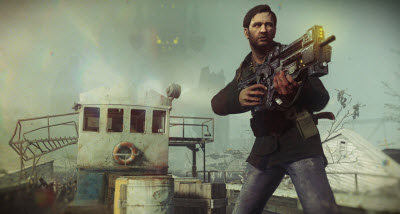 The new Deadeye sniper rifle is one of the most handy weapons. You only get 20 bullets, but you can use it take out an enemy with one shot. You can fire on the enemy from afar and vaporize the enemy’s head. The Marksman sniper rifle usually requires two shots to kill the average Chimera, so the Deadeye is welcome on many occasions. But the Marksman will let you drop a sniper bot in a location across a distance so you can set up a killing zone and a distraction for enemies. Even the little .44 HE Magnum handgun is useful, as it can fire shells that explode when you pull the R2 trigger.
The new Deadeye sniper rifle is one of the most handy weapons. You only get 20 bullets, but you can use it take out an enemy with one shot. You can fire on the enemy from afar and vaporize the enemy’s head. The Marksman sniper rifle usually requires two shots to kill the average Chimera, so the Deadeye is welcome on many occasions. But the Marksman will let you drop a sniper bot in a location across a distance so you can set up a killing zone and a distraction for enemies. Even the little .44 HE Magnum handgun is useful, as it can fire shells that explode when you pull the R2 trigger.
I enjoyed weapons such as the Atomizer, which shoots out lightning bolts at enemies at relatively close range. I used the Deadeye a lot as well as the M5A2 Carbine assault rifle. The Bullseye was also useful, as you could fire a tag at an enemy, like one of the flying Chimera known as Long Legs. Once the tag hits the enemy, every shot you fire is drawn automatically to the tag. So even without aiming, you can let loose on the trigger and take out a tagged enemy as they are moving. The Rossmore shotgun was surprisingly useful because it could fire flaming shots after leveling up. It’s always good to give the enemy a light. Overall, the weapons I used most were the Deadeye and the M5a2.
Grenades are also useful. The Hedgehog grenade sends out spikes in all directions, while the EMP grenade takes out the energy shield of an enemy. There are some tank-like enemies that you can’t even engage until you take out their shields. You can also lob a Molotov cocktail at groups of Chimera and set them on fire. The core fun of Resistance 3 is that in any 30-second period, you have to shoot, switch weapons, move, and switch weapons again to protect yourself at close range.
If all this talk about weapons seems a bit much, keep in mind that in the Resistance games, just like in the Ratchet & Clank games that Insomniac also makes, the weapons are always the stars of the show. Fortunately, in this case, the human characters and stories are also interesting. While the weapons seem like they’re really powerful, so are the enemies and their bosses that you have to fight.
The wide array of weapons is necessary to deal with the variety of enemies and their behavior. The standard Chimera soldiers, or Hybrids, require a few shots to take down, unless you get them in the head with a single shot. But they become a lot harder to deal with if they are protected by shield drones, which fly above them and then shield them from all attacks. You have to shoot out the drone first before you can take out the soldier. That’s a waste of ammo, but it’s absolutely necessary before the invulnerable Hybrids close in on you and start a melee fight.
Among the new enemies are the Grim, or zombie-like creatures that hatch from cocoons and charge you in packs. You have to fire your shotgun at them, hopefully killing them two at a time but almost always in the nick of time before they rip you to shreds.
The Long Legs version of the Chimera are tough to deal with because they can jump huge distances, flying to the tops of buildings and taking you out with sniper rifles. They can outflank you simply by jumping right behind you, so you have to be paranoid in firefights with them by always checking your back.
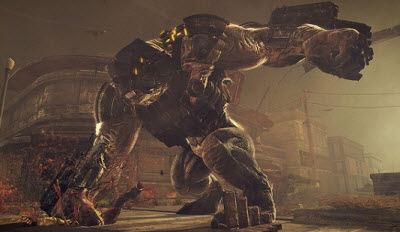 The escalation of the battles leads you to tougher enemies such as Ravagers, which carry energy shields and fire with Auger rifles. Attacking them is like shooting at a tank, and you often have to use a lot of grenades or sniper bullets to take them down. Bosses include a giant underground worm, spider-like creatures, and Brawlers (pictured right, which go berserk and charge you with all their might. The best thing to take the Brawlers down are rockets and grenades. But if you plug them with enough high-explosive Magnum bullets, you can do some real damage to them. Brawlers are pretty unnerving, as you feel like you’re being chased by King Kong. But if they’re not charging, they’re a little slow.
The escalation of the battles leads you to tougher enemies such as Ravagers, which carry energy shields and fire with Auger rifles. Attacking them is like shooting at a tank, and you often have to use a lot of grenades or sniper bullets to take them down. Bosses include a giant underground worm, spider-like creatures, and Brawlers (pictured right, which go berserk and charge you with all their might. The best thing to take the Brawlers down are rockets and grenades. But if you plug them with enough high-explosive Magnum bullets, you can do some real damage to them. Brawlers are pretty unnerving, as you feel like you’re being chased by King Kong. But if they’re not charging, they’re a little slow.
The real difficulty of the game is that the different enemies often appear in packs, so you have to switch weapons constantly to take out the enemy that is the most threatening to you at any given time.
One of the surprises of the game is that you wind up having to fight other humans. It’s one of the twists that is understandable. As the end of the world approaches, it’s only natural that survivalist groups emerge with an “everybody for himself” attitude. That part of the game is a glimpse into the dark side of human nature.
Most video game series end after three titles, but it’s not clear if that’s the case with Resistance 3. The ending leaves room for more games, though the Chimera do get a pretty good kick in the butt this time. If it is the conclusion, then the ending is pretty fulfilling. You won’t be left with an unsatisfying cliffhanger or a hint about the next installment in the series.
Resistance 3 is the first in the series to support 3D viewing and the PlayStation Move, but I didn’t bother with either. I don’t have a 3D TV and I’m not happy with how they display images now, based on a lot of bad demos I’ve seen. As for the Move, I can shoot more accurately using an old-fashioned controller. The game did crash on me twice, but that’s nothing to worry about, as it automatically saves and returns you to a previous point in the action. It wasn’t enough to hurt the overall experience, which was a memorable way to start this fall blockbuster season.
With Capelli’s need to protect his family, the Resistance series is finally doing a better job of making you care about its characters. For the most part, the best blockbuster games always give you something more than just pure adrenaline action. That combination of great story, graphics, art, action, sound, and setting makes them modern technological and artistic marvels. It’s harder to do these kinds of games in the current environment of slowing console sales and the rise of platforms such as Facebook, the iPhone, tablets, and casual titles that steal time away from the audience for console games. But I’m glad that Sony and Insomniac Games have stayed the course in creating one of the best games of the year so far. I give it a rating of 90 out of 100.
VentureBeat's mission is to be a digital town square for technical decision-makers to gain knowledge about transformative enterprise technology and transact. Learn More


